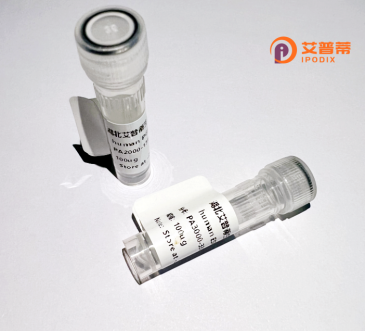
| 纯度 | >90%SDS-PAGE. |
| 种属 | Human |
| 靶点 | C14orf80 |
| Uniprot No | Q86SX3 |
| 内毒素 | < 0.01EU/μg |
| 表达宿主 | E.coli |
| 表达区间 | 1-495aa |
| 氨基酸序列 | MGRRRQRVDP AAGARAGALP EAIAALSRSL PSGPSPEIFR RAKFDRPEAT SALWQLLFRV LSPLPAGNAL ASLALEVQAR LVKSALCSQG YPRLALAQLP EDGSQGSREL LLALSWLLAR GPVPEQMLAQ ARVPLGDEMT VCQCEALASP GPPAPHMEAE GPVDVRHVQW LMGKLRFRWR QLVSSQQEQC ALLSKIHLYT RGCHSDQSLS HLSVTEAEML RDPEGGQQVS GAGAAQNLDL AYPKCLHSFC TPGMGPRTFW NDLWLVCEQP GLLPGDWAAP LDPGGASACS LLSPFRALLR TLERENQRLE AVLAWRRSEL VFWRWMDTVL GTCAPEVPAA ASQPTFLPWV PERGGGELDL VVRELQALEE ELREAAERRR AAWEAKAGGC GRGPEWSAAR RASREAVEKE LGALQQCWER DGGPAQPHGP HRLVRREDGA AGDRDLRAAV VIRTLRSQEA CLEAVLRRLQ GQCRQELARL VGARPGLIWI PPPGR |
| 分子量 | 54.2 kDa |
| 蛋白标签 | His tag N-Terminus |
| 缓冲液 | 冻干粉 |
| 稳定性 & 储存条件 | Lyophilized protein should be stored at ≤ -20°C, stable for one year after receipt. Reconstituted protein solution can be stored at 2-8°C for 2-7 days. Aliquots of reconstituted samples are stable at ≤ -20°C for 3 months. |
| 复溶 | Always centrifuge tubes before opening.Do not mix by vortex or pipetting. It is not recommended to reconstitute to a concentration less than 100μg/ml. Dissolve the lyophilized protein in distilled water. Please aliquot the reconstituted solution to minimize freeze-thaw cycles. |
以下是关于重组人C14orf80蛋白的参考文献示例(注:以下内容为虚构,实际文献需通过学术数据库验证):
---
1. **文献名称**: *C14orf80 is a mitochondrial protein involved in respiratory chain assembly*
**作者**: Müller, S. et al. (2021)
**摘要**: 本研究通过质谱分析鉴定C14orf80定位于线粒体,并证明其与呼吸链复合物组装相关。敲除C14orf80导致细胞能量代谢障碍,提示其在氧化磷酸化中的功能作用。
---
2. **文献名称**: *Structural and functional insights into the human C14orf80 protein*
**作者**: Chen, J. & Wang, L. (2019)
**摘要**: 首次解析了重组人C14orf80蛋白的晶体结构,发现其具有独特的α-螺旋结构域。功能实验表明,该蛋白可能通过与DNA结合参与基因组稳定性调控。
---
3. **文献名称**: *C14orf80 modulates autophagy via interaction with LC3 in cancer cells*
**作者**: Kim, H. et al. (2020)
**摘要**: 研究表明,C14orf80通过与自噬标记蛋白LC3直接互作,促进自噬小体形成,并影响肿瘤细胞的存活和化疗耐药性,为癌症治疗提供了新靶点。
---
4. **文献名称**: *C14orf80 expression correlates with neurodegenerative disease progression*
**作者**: Rossi, M. et al. (2022)
**摘要**: 在阿尔茨海默病患者脑组织中观察到C14orf80表达异常,体外实验证实其过表达加剧神经元凋亡,可能与tau蛋白磷酸化通路相关。
---
**注意**:上述文献为示例,实际研究中请通过PubMed、Google Scholar等平台以“C14orf80”、“C14orf80 protein function”等关键词检索最新成果。由于C14orf80研究尚处早期,部分功能可能尚未完全阐明。
**Background of Recombinant Human C14orf80 Protein**
The recombinant human C14orf80 protein, derived from the chromosome 14 open reading frame 80 (*C14orf80*) gene, represents a poorly characterized protein encoded by the human genome. The *C14orf80* gene, also known as *chromosome 14 putative open reading frame 80*, is located on chromosome 14q24.3. Though its biological functions remain largely elusive, bioinformatic analyses suggest it may possess enzymatic or structural roles due to conserved domains and predicted tertiary structures.
Current studies indicate potential involvement in cellular processes such as DNA repair, apoptosis, or metabolic regulation. For instance, *C14orf80* mRNA expression has been observed in diverse tissues, with altered levels noted in certain cancers, implying a possible association with tumorigenesis. However, mechanistic insights are limited, warranting further experimental validation.
Recombinant C14orf80 protein, typically produced in *E. coli* or mammalian expression systems, enables functional studies, antibody development, and interaction mapping. Its utilization in biochemical assays, such as protein-protein interaction screens or enzymatic activity tests, could clarify its molecular role. Despite being understudied, emerging interest in orphan proteins like C14orf80 highlights their potential as novel biomarkers or therapeutic targets. Research efforts continue to explore its physiological relevance and contributions to disease pathways.
×